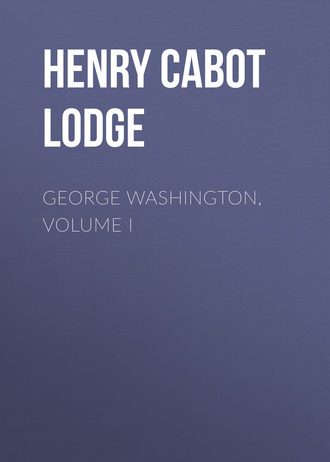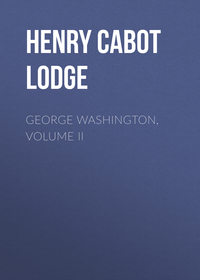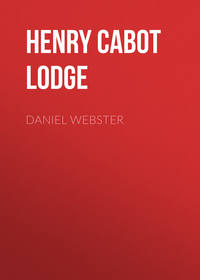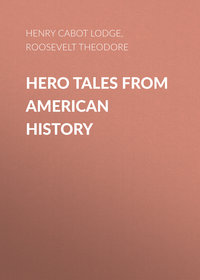 полная версия
полная версияGeorge Washington, Volume I
CHAPTER V
TAKING COMMAND
In the warm days of closing August, a party of three gentlemen rode away from Mount Vernon one morning, and set out upon their long journey to Philadelphia. One cannot help wondering whether a tender and somewhat sad remembrance did not rise in Washington's mind, as he thought of the last time he had gone northward, nearly twenty years before. Then, he was a light-hearted young soldier, and he and his aides, albeit they went on business, rode gayly through the forests, lighting the road with the bright colors they wore and with the glitter of lace and arms, while they anticipated all the pleasures of youth in the new lands they were to visit. Now, he was in the prime of manhood, looking into the future with prophetic eyes, and sober as was his wont when the shadow of coming responsibility lay dark upon his path. With him went Patrick Henry, four years his junior, and Edmund Pendleton, now past threescore. They were all quiet and grave enough, no doubt; but Washington, we may believe, was gravest of all, because, being the most truthful of men to himself as to others, he saw more plainly what was coming. So they made their journey to the North, and on the memorable 5th of September they met with their brethren from the other colonies in Carpenters' Hall in Philadelphia.
The Congress sat fifty-one days, occupied with debates and discussion. Few abler, more honest, or more memorable bodies of men have ever assembled to settle the fate of nations. Much debate, great and earnest in all directions, resulted in a declaration of colonial rights, in an address to the king, in another to the people of Canada, and a third to the people of Great Britain; masterly state papers, seldom surpassed, and extorting even then the admiration of England. In these debates and state papers Washington took no part that is now apparent on the face of the record. He was silent in the Congress, and if he was consulted, as he unquestionably was by the committees, there is no record of it now. The simple fact was that his time had not come. He saw men of the most acute minds, liberal in education, patriotic in heart, trained in law and in history, doing the work of the moment in the best possible way. If anything had been done wrongly, or had been left undone, Washington would have found his voice quickly enough, and uttered another of the "most eloquent speeches ever made," as he did shortly before in the Virginia convention. He could speak in public when need was, but now there was no need and nothing to arouse him. The work of Congress followed the line of policy adopted by the Virginia convention, and that had proceeded along the path marked out in the Fairfax resolves, so that Washington could not be other than content. He occupied his own time, as we see by notes in his diary, in visiting the delegates from the other colonies, and in informing himself as to their ideas and purposes, and those of the people whom they represented. He was quietly working for the future, the present being well taken care of. Yet this silent man, going hither and thither, and chatting pleasantly with this member or that, was in some way or other impressing himself deeply on all the delegates, for Patrick Henry said: "If you speak of solid information and sound judgment, Colonel Washington is unquestionably the greatest man on the floor."
We have a letter, written at just this time, which shows us how Washington felt, and we see again how his spirit rose as he saw more and more clearly that the ultimate issue was inevitable. The letter is addressed to Captain Mackenzie, a British officer at Boston, and an old friend. "Permit me," he began, "with the freedom of a friend (for you know I always esteemed you), to express my sorrow that fortune should place you in a service that must fix curses to the latest posterity upon the contrivers, and, if success (which, by the by, is impossible) accompanies it, execrations upon all those who have been instrumental in the execution." This was rather uncompromising talk and not over peaceable, it must be confessed. He continued: "Give me leave to add, and I think I can announce it as a fact, that it is not the wish or intent of that government [Massachusetts], or any other upon this continent, separately or collectively, to set up for independence; but this you may at the same time rely on, that none of them will ever submit to the loss of those valuable rights and privileges which are essential to the happiness of every free state, and without which life, liberty, and property are rendered totally insecure.... Again give me leave to add as my opinion that more blood will be spilled on this occasion, if the ministry are determined to push matters to extremity, than history has ever yet furnished instances of in the annals of North America, and such a vital wound will be given to the peace of this great country, as time itself cannot cure or eradicate the remembrance of." Washington was not a political agitator like Sam Adams, planning with unerring intelligence to bring about independence. On the contrary, he rightly declared that independence was not desired. But although he believed in exhausting every argument and every peaceful remedy, it is evident that he felt that there now could be but one result, and that violent separation from the mother country was inevitable. Here is where he differed from his associates and from the great mass of the people, and it is to this entire veracity of mind that his wisdom and foresight were so largely due, as well as his success when the time came for him to put his hand to the plough.
When Congress adjourned, Washington returned to Mount Vernon, to the pursuits and pleasures that he loved, to his family and farm, and to his horses and hounds, with whom he had many a good run, the last that he was to enjoy for years to come. He returned also to wait and watch as before, and to see war rapidly gather in the east. When the Virginia convention again assembled, resolutions were introduced to arm and discipline men, and Henry declared in their support that an "appeal to arms and to the God of Hosts" was all that was left. Washington said nothing, but he served on the committee to draft a plan of defense, and then fell to reviewing the independent companies which were springing up everywhere. At the same time he wrote to his brother John, who had raised a troop, that he would accept the command of it if desired, as it was his "full intention to devote his life and fortune in the cause we are engaged in, if needful." At Mount Vernon his old comrades of the French war began to appear, in search of courage and sympathy. Thither, too, came Charles Lee, a typical military adventurer of that period, a man of English birth and of varied service, brilliant, whimsical, and unbalanced. There also came Horatio Gates, likewise British, and disappointed with his prospects at home; less adventurous than Lee, but also less brilliant, and not much more valuable.
Thus the winter wore away; spring opened, and toward the end of April Washington started again for the North, much occupied with certain tidings from Lexington and Concord which just then spread over the land. He saw all that it meant plainly enough, and after noting the fact that the colonists fought and fought well, he wrote to George Fairfax in England: "Unhappy it is to reflect that a brother's sword has been sheathed in a brother's breast, and that the once happy and peaceful plains of America are either to be drenched in blood or inhabited by slaves. Sad alternative. But can a virtuous man hesitate in his choice?" Congress, it would seem, thought there was a good deal of room for hesitation, both for virtuous men and others, and after the fashion of their race determined to do a little more debating and arguing, before taking any decisive step. After much resistance and discussion, a second "humble and dutiful petition" to the king was adopted, and with strange contradiction a confederation was formed at the same time, and Congress proceeded to exercise the sovereign powers thus vested in them. The most pressing and troublesome question before them was what to do with the army surrounding Boston, and with the actual hostilities there existing.
Washington, for his part, went quietly about as before, saying nothing and observing much, working hard as chairman of the military committees, planning for defense, and arranging for raising an army. One act of his alone stands out for us with significance at this critical time. In this second Congress he appeared habitually on the floor in his blue and buff uniform of a Virginia colonel. It was his way of saying that the hour for action had come, and that he at least was ready for the fight whenever called upon.
Presently he was summoned. Weary of waiting, John Adams at last declared that Congress must adopt the army and make Washington, who at this mention of his name stepped out of the room, commander-in-chief. On June 15, formal motions were made to this effect and unanimously adopted, and the next day Washington appeared before Congress and accepted the trust. His words were few and simple. He expressed his sense of his own insufficiency for the task before him, and said that as no pecuniary consideration could have induced him to undertake the work, he must decline all pay or emoluments, only looking to Congress to defray his expenses. In the same spirit he wrote to his soldiers in Virginia, to his brother, and finally, in terms at once simple and pathetic, to his wife. There was no pretense about this, but the sternest reality of self-distrust, for Washington saw and measured as did no one else the magnitude of the work before him. He knew that he was about to face the best troops of Europe, and he had learned by experience that after the first excitement was over he would be obliged to rely upon a people who were brave and patriotic, but also undisciplined, untrained, and unprepared for war, without money, without arms, without allies or credit, and torn by selfish local interests. Nobody else perceived all this as he was able to with his mastery of facts, but he faced the duty unflinchingly. He did not put it aside because he distrusted himself, for in his truthfulness he could not but confess that no other American could show one tithe of his capacity, experience, or military service. He knew what was coming, knew it, no doubt, when he first put on his uniform, and he accepted instantly.
John Adams in his autobiography speaks of the necessity of choosing a Southern general, and also says there were objectors to the selection of Washington even among the Virginia delegates. That there were political reasons for taking a Virginian cannot be doubted. But the dissent, even if it existed, never appeared on the surface, excepting in the case of John Hancock, who, with curious vanity, thought that he ought to have this great place. When Washington's name was proposed there was no murmur of opposition, for there was no man who could for one moment be compared with him in fitness. The choice was inevitable, and he himself felt it to be so. He saw it coming; he would fain have avoided the great task, but no thought of shrinking crossed his mind. He saw with his entire freedom from constitutional subtleties that an absolute parliament sought to extend its power to the colonies. To this he would not submit, and he knew that this was a question which could be settled only by one side giving way, or by the dread appeal to arms. It was a question of fact, hard, unrelenting fact, now to be determined by battle, and on him had fallen the burden of sustaining the cause of his country. In this spirit he accepted his commission, and rode forth to review the troops. He was greeted with loud acclaim wherever he appeared. Mankind is impressed by externals, and those who gazed upon Washington in the streets of Philadelphia felt their courage rise and their hearts grow strong at the sight of his virile, muscular figure as he passed before them on horseback, stately, dignified, and self-contained. The people looked upon him, and were confident that this was a man worthy and able to dare and do all things.
On June 21 he set forth accompanied by Lee and Schuyler, and with a brilliant escort. He had ridden but twenty miles when he was met by the news of Bunker Hill. "Did the militia fight?" was the immediate and characteristic question; and being told that they did fight, he exclaimed, "Then the liberties of the country are safe." Given the fighting spirit, Washington felt he could do anything. Full of this important intelligence he pressed forward to Newark, where he was received by a committee of the provincial congress, sent to conduct the commander-in-chief to New York. There he tarried long enough to appoint Schuyler to the charge of the military affairs in that colony, having mastered on the journey its complicated social and political conditions. Pushing on through Connecticut he reached Watertown, where he was received by the provincial congress of Massachusetts, on July 2, with every expression of attachment and confidence. Lingering less than an hour for this ceremony, he rode on to the headquarters at Cambridge, and when he came within the lines the shouts of the soldiers and the booming of cannon announced his arrival to the English in Boston.
The next day he rode forth in the presence of a great multitude, and the troops having been drawn up before him, he drew his sword beneath the historical elm-tree, and took command of the first American army. "His excellency," wrote Dr. Thatcher in his journal, "was on horseback in company with several military gentlemen. It was not difficult to distinguish him from all others. He is tall and well proportioned, and his personal appearance truly noble and majestic." "He is tall and of easy and agreeable address," the loyalist Curwen had remarked a few weeks before; while Mrs. John Adams, warm-hearted and clever, wrote to her husband after the general's arrival: "Dignity, ease, and complacency, the gentleman and the soldier, look agreeably blended in him. Modesty marks every line and feature of his face. Those lines of Dryden instantly occurred to me,—
'Mark his majestic fabric! He's a templeSacred by birth, and built by hands divine;His soul's the deity that lodges there;Nor is the pile unworthy of the God.'"Lady, lawyer, and surgeon, patriot and tory, all speak alike, and as they wrote so New England felt. A slave-owner, an aristocrat, and a churchman, Washington came to Cambridge to pass over the heads of native generals to the command of a New England army, among a democratic people, hard-working and simple in their lives, and dissenters to the backbone, who regarded episcopacy as something little short of papistry and quite equivalent to toryism. Yet the shout that went up from soldiers and people on Cambridge common on that pleasant July morning came from the heart and had no jarring note. A few of the political chiefs growled a little in later days at Washington, but the soldiers and the people, high and low, rich and poor, gave him an unstinted loyalty. On the fields of battle and throughout eight years of political strife the men of New England stood by the great Virginian with a devotion and truth in which was no shadow of turning. Here again we see exhibited most conspicuously the powerful personality of the man who was able thus to command immediately the allegiance of this naturally cold and reserved people. What was it that they saw which inspired them at once with so much confidence? They looked upon a tall, handsome man, dressed in plain uniform, wearing across his breast a broad blue band of silk, which some may have noticed as the badge and symbol of a certain solemn league and covenant once very momentous in the English-speaking world. They saw his calm, high bearing, and in every line of face and figure they beheld the signs of force and courage. Yet there must have been something more to call forth the confidence then so quickly given, and which no one ever long withheld. All felt dimly, but none the less surely, that here was a strong, able man, capable of rising to the emergency, whatever it might be, capable of continued growth and development, clear of head and warm of heart; and so the New England people gave to him instinctively their sympathy and their faith, and never took either back.
The shouts and cheers died away, and then Washington returned to his temporary quarters in the Wadsworth house, to master the task before him. The first great test of his courage and ability had come, and he faced it quietly as the excitement caused by his arrival passed by. He saw before him, to use his own words, "a mixed multitude of people, under very little discipline, order, or government." In the language of one of his aides:13 "The entire army, if it deserved the name, was but an assemblage of brave, enthusiastic, undisciplined, country lads; the officers in general quite as ignorant of military life as the troops, excepting a few elderly men, who had seen some irregular service among the provincials under Lord Amherst." With this force, ill-posted and very insecurely fortified, Washington was to drive the British from Boston. His first step was to count his men, and it took eight days to get the necessary returns, which in an ordinary army would have been furnished in an hour. When he had them, he found that instead of twenty thousand, as had been represented, but fourteen thousand soldiers were actually present for duty. In a short time, however, Mr. Emerson, the chaplain, noted in his diary that it was surprising how much had been done, that the lines had been so extended, and the works so shrewdly built, that it was morally impossible for the enemy to get out except in one place purposely left open. A little later the same observer remarked: "There is a great overturning in the camp as to order and regularity; new lords, new laws. The Generals Washington and Lee are upon the lines every day. The strictest government is taking place, and great distinction is made between officers and soldiers." Bodies of troops scattered here and there by chance were replaced by well-distributed forces, posted wisely and effectively in strong intrenchments. It is little wonder that the worthy chaplain was impressed, and now, seeing it all from every side, we too can watch order come out of chaos and mark the growth of an army under the guidance of a master-mind and the steady pressure of an unbending will.
Then too there was no discipline, for the army was composed of raw militia, who elected their officers and carried on war as they pleased. In a passage suppressed by Mr. Sparks, Washington said: "There is no such thing as getting officers of this stamp to carry orders into execution—to curry favor with the men (by whom they were chosen, and on whose smile they may possibly think that they may again rely) seems to be one of the principal objects of their attention. I have made a pretty good slam amongst such kind of officers as the Massachusetts government abounds in, since I came into this camp, having broke one colonel and two captains for cowardly behavior in the action on Bunker Hill, two captains for drawing more pay and provisions than they had men in their company, and one for being absent from his post when the enemy appeared there and burnt a house just by it. Besides these I have at this time one colonel, one major, one captain, and two subalterns under arrest for trial. In short, I spare none, and yet fear it will not all do, as these people seem to be too attentive to everything but their own interests." This may be plain and homely in phrase, but it is not stilted, and the quick energy of the words shows how the New England farmers and fishermen were being rapidly brought to discipline. Bringing the army into order, however, was but a small part of his duties. It is necessary to run over all his difficulties, great and small, at this time, and count them up, in order to gain a just idea of the force and capacity of the man who overcame them.
Washington, in the first place, was obliged to deal not only with his army, but with the general congress and the congress of the province. He had to teach them, utterly ignorant as they were of the needs and details of war, how to organize and supply their armies. There was no commissary department, there were no uniforms, no arrangements for ammunition, no small arms, no cannon, no resources to draw upon for all these necessaries of war. Little by little he taught Congress to provide after a fashion for these things, little by little he developed what he needed, and by his own ingenuity, and by seizing alertly every suggestion from others, he supplied for better or worse one deficiency after another. He had to deal with various governors and various colonies, each with its prejudices, jealousies, and shortcomings. He had to arrange for new levies from a people unused to war, and to settle with infinite anxiety and much wear and tear of mind and body, the conflict as to rank among officers to whom he could apply no test but his own insight. He had to organize and stimulate the arming of privateers, which, by preying on British commerce, were destined to exercise such a powerful influence on the fate of the war. It was neither showy nor attractive, such work as this, but it was very vital, and it was done.
By the end of July the army was in a better posture of defense; and then at the beginning of the next month, as the prospect was brightening, it was suddenly discovered that there was no gunpowder. An undrilled army, imperfectly organized, was facing a disciplined force and had only some nine rounds in the cartridge-boxes. Yet there is no quivering in the letters from headquarters. Anxiety and strain of nerve are apparent; but a resolute determination rises over all, supported by a ready fertility of resource. Couriers flew over the country asking for powder in every town and in every village. A vessel was even dispatched to the Bermudas to seize there a supply of powder, of which the general, always listening, had heard. Thus the immediate and grinding pressure was presently relieved, but the staple of war still remained pitifully and perilously meagre all through the winter.
Meantime, while thus overwhelmed with the cares immediately about him, Washington was watching the rest of the country. He had a keen eye upon Johnson and his Indians in the valley of the Mohawk; he followed sharply every movement of Tryon and the Tories in New York; he refused with stern good sense to detach troops to Connecticut and Long Island, knowing well when to give and when to say No, a difficult monosyllable for the new general of freshly revolted colonies. But if he would not detach in one place, he was ready enough to do so in another. He sent one expedition by Lake Champlain, under Montgomery, to Montreal, and gave Arnold picked troops to march through the wilds of Maine and strike Quebec. The scheme was bold and brilliant, both in conception and in execution, and came very near severing Canada forever from the British crown. A chapter of little accidents, each one of which proved as fatal as it was unavoidable, a moment's delay on the Plains of Abraham, and the whole campaign failed; but there was a grasp of conditions, a clearness of perception, and a comprehensiveness about the plan, which stamp it as the work of a great soldier, who saw besides the military importance, the enormous political value held out by the chance of such a victory.
The daring, far-reaching quality of this Canadian expedition was much more congenial to Washington's temper and character than the wearing work of the siege. All that man could do before Boston was done, and still Congress expected the impossible, and grumbled because without ships he did not secure the harbor. He himself, while he inwardly resented such criticism, chafed under the monotonous drudgery of the intrenchments. He was longing, according to his nature, to fight, and was, it must be confessed, quite ready to attempt the impossible in his own way. Early in September he proposed to attack the town in boats and by the neck of land at Roxbury, but the council of officers unanimously voted against him. A little more than a month later he planned another attack, and was again voted down by his officers. Councils of war never fight, it is said, and perhaps in this case it was well that such was their habit, for the schemes look rather desperate now. To us they serve to show the temper of the man, and also his self-control in this respect at the beginning of the war, for Washington became ready enough afterwards to override councils when he was wholly free from doubt himself.





